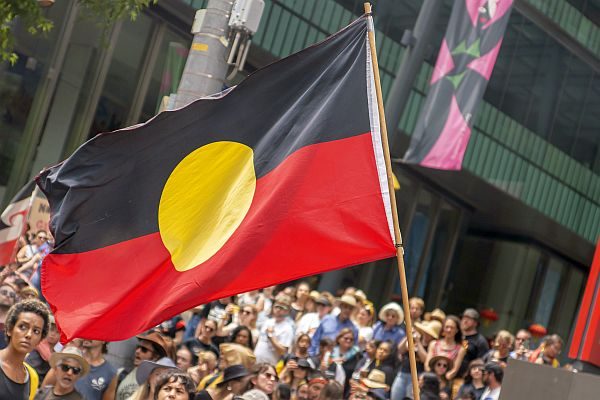Australia Day is for the Gubs. Not just some Gubs, but all Gubs. It is inclusive in that, whether it is loved or hated, it can’t be ignored. For those who are into great streaks of zinc cream across their faces, it is a great day for beaches, bbqs and a bit of burqa bashing if that is their bent. For the Balmain bolshies, it is a great day to reminisce about the Bridge walk and lament the fate of their blak brothers and sisters.
Australia Day is a great day for the mad uncle avatar. As an Aboriginal person I am going to hear that I’m lucky it was the British, and not the wogs; if it wasn’t for the British, I’d still be trapped in the stone age; it was pretty ordinary for the whitefellows, too; I should get over myself; you look mixed, what part are you?
Australia Day is a bastard in another manner. The First Fleet arrived at Botany Bay between the 18th and 20th of January. The officers of the First Fleet were relieved when the two warships sighted off the coast on the 24th turned out to be French and not Dutch. True, there was a flag-raising ceremony and a tipple in Port Jackson on the 26th, but the formal proclamation of the colony of NSW took place on the 7th of February. Conceptually, Australia did not exist until Matthew Flinders used the word as an alternative to New Holland in 1804. Politically, Australia did not exist until the 1st of January 1901. The true parent of Australia Day is the Rum Rebellion of the 26th of January 1808, when the rich and greedy ritually re-enacted an endlessly repetitive cycle of self-approving appropriation.
Australia Day has been a distraction from reality since the ‘Aboriginal Day of Mourning and Protest’ held on ‘the 150th anniversary of the whitemen’s seizure of our country’. Australia still holds a world record in its incarceration rates for Aboriginal people. In this context, Australia Day is a celebration of settler moves to innocence. Australia Day truly belongs on the beach, where in the blinding light of the afternoon sun, the ebbing tide erases the past, and its memory. The perpetuation of the myth of Australia Day is a signifier of a floundering democracy; an ever-recurring dog whistle; a bone thrown in the air for the powerless to exhaust themselves in a pointless struggle; a distraction from the real issues of treaty, reparations, and building a just society that acknowledges and addresses the stolen country it’s founded on.
The 26th of January is a wandering ghoul, dead, but not knowing it is dead. No-one owns it, no-one wants to take responsibility for getting rid of it, and no-one knows how to get rid of it.
The reality is that the eleven ships brought smallpox, influenza, tuberculosis, gonorrhoea, prejudices about Aboriginal people, and ill-founded assumptions about land management that found fruition in the 2020 bushfires. The legacy of the 26th of January 1788 continues to haunt all of us. From an Aboriginal perspective, Reconciliation is, like Australia Day, a distraction. Aboriginal people and settlers were never united, brought together, or conciliated. However, for the beneficiaries of settlement, reconciliation should be an internal process; a process of clearing the darkling glass, of knowing and being known; of being one with the better angels of charity and loving-kindness. Learning to listen to and acknowledge Country; understanding and taking responsibility for ‘the torment of our powerlessness’ are the first steps in this journey.
Know the lies for what they are.


